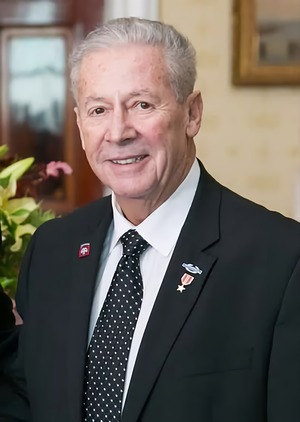(NewsNation) — When veterans dealing with addiction or other issues related to mental health find themselves in the criminal justice system for low-level crimes, a number of them are directed to the more than 400 veterans treatment courts across America, designed to keep them out of jail and connect them with the resources they need.

It’s a practice that has expanded to several states nationwide since the first veterans treatment court was founded in Buffalo, New York, in 2008.
Jack O’Connor, a Vietnam veteran who today serves as a veteran mentor at that court, remembers how the idea came together. Then-Judge Robert Russell, who was overseeing a mental health court, encountered a veteran who wouldn’t say much in his meetings with therapists.
Russell decided to ask a pair of veterans working with the county, including O’Connor, to talk to the veteran. So they took him out into the hallway and talked to him.
“All that man wanted was to talk to some more vets,” O’Connor said. “In his counseling program, there weren’t that many veterans.”
When that veteran returned to court, his demeanor completely changed, and he had a much more cooperative attitude.
The judge realized that he had dozens of veterans appearing before the drug court and mental health court, giving Russell the idea to start a treatment court specifically for veterans.
Around a year later, they launched the nation’s first veterans treatment court with the support of national stakeholders like the Department of Veterans Affairs.
The court operates much like a typical drug or mental health treatment court. Veteran defendants who have some form of substance dependency problem or mental illness who are charged with either a misdemeanor or felony for most offenses are eligible to go through a treatment plan.
That plan is created by a range of staff that includes health care professionals, court staff and veteran peer mentors. It can include everything from medication to group therapy to regular drug testing.
The goal is for the veteran to work through the plan in what often takes a year or longer and graduate.
By graduating, veterans can have their crimes reduced from felonies to misdemeanors and/or avoid prison time.
O’Connor emphasized this process can be particularly valuable for veterans.
“If you’re in the Guard or Reserve, if you get a felony, you can’t carry a gun. If you can’t carry a gun, you can’t be in the military,” he said.
O’Connor is one of 30 veteran volunteers currently working with the court to serve as mentors for people going through treatment programs. Six of those mentors are graduates of the court themselves.
“Vets talk to vets even when they’re screwed up. When they first come in the court, they don’t trust the judge, they don’t trust the cops, they’ve got a chip on their shoulder, many of them, who are drug-addicted,” O’Connor said. “They’re there because this is their last shot. But they’ll talk to me.”
While mentors like O’Connor play an important role in communicating with veterans and guiding them through treatment, there are still obstacles.
He mentioned that transportation can be a challenge for veterans who’ve lost their driver’s licenses due to misconduct. He said that an area nonprofit organization he founded to help veterans spends around $15,000 a year on bus passes alone.
To O’Connor, veterans courts have an impact that goes far beyond helping one defendant or another.
“We’re not just helping the vets. We’re helping the families, and we’re helping the communities,” he said. “The guy is back at work at Chevy or Ford, or he’s back in the service.”
This post was originally published on this site be sure to check out more of their content.






